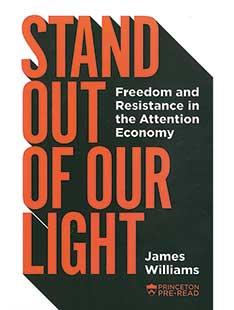Sapping Our Attention
Class of 2023 Pre-read author James Williams, a former digital strategist, warns of the tech dangers that surround us

James Williams is a former Google strategist who recently completed doctoral work in technology ethics at Oxford. He is the author of this year’s Pre-read, Stand Out of Our Light: Freedom and Resistance in the Attention Economy (Cambridge University Press), which examines the pervasive effects of digital technologies on our attention and willpower. He spoke with PAW the day after addressing the freshman class.
You write that a reckoning with digital technologies and their effect on attention “may be the defining moral and political struggle of our time.” Why is it so important?
It’s what we might call a first-order issue. To combat climate change, to combat all these big problems in the world, I think we first have to be paying attention to the right things; it seems to me to be a prerequisite.
President Eisgruber ’83 wrote in his foreword to your book about how students and even faculty say digital devices make it hard “to lose themselves in a book or an idea.” What can a university do?
Universities [are] extraordinarily important in that they are institutions whose mission includes the preservation of a certain depth of thought. At the end of the day I think it’s really about keeping in mind our goals, our values, our missions — why students are here, why academia, why education matters — and making sure, at every chance we get, that our environment is aligned with these.
You write about feeling a “deep” distraction that you couldn’t quite name. What are some of those attention-deficit warning signs?
I think it will be different for everyone. A lot of the time it involves some problem connecting with a previous desire or intention that they’ve had. One way you see this broadly in career settings is a midlife crisis, where you realize, “I’ve unconsciously started playing this game I didn’t realize I was playing.” I think broadly it’s when there’s some moment of reflection about what you care about, what’s important, and then you look at your life and there’s a distance there.
In your book you draw on Jan-Werner Müller’s What Is Populism? How do digital technologies contribute to the rise of populism?
What I was drawn to in Professor Müller’s concept of populism was ... the way he talks about populism as being a moralizing realm. Many digital technologies are biased toward a kind of moral outrage. It seems to me that the moment we see those kind of technologies becoming the core communication platforms of society, it’s to be expected that you would see populism in that description he gives.
What advice would you have for alumni who want to think about the effect of digital media on their lives?
One thing I would say is that the question isn’t limited to momentary distraction; it relates to the ways in which media shape our habits [and] shape our lives over time. In a way it’s not even only about the use of the technology itself. Even if somebody doesn’t use any smartphone, any technology ... they [might still] read news articles. Journalism has essentially been colonized by Twitter. Every journalist I’ve talked to says they’re on Twitter all day; it’s become kind of the newswire. So the logic of the attention economy is not confined to an experience with devices; it’s something that is now cast like an umbrella across all of our media.
Interview conducted and condensed by Allie Spensley ’20












No responses yet